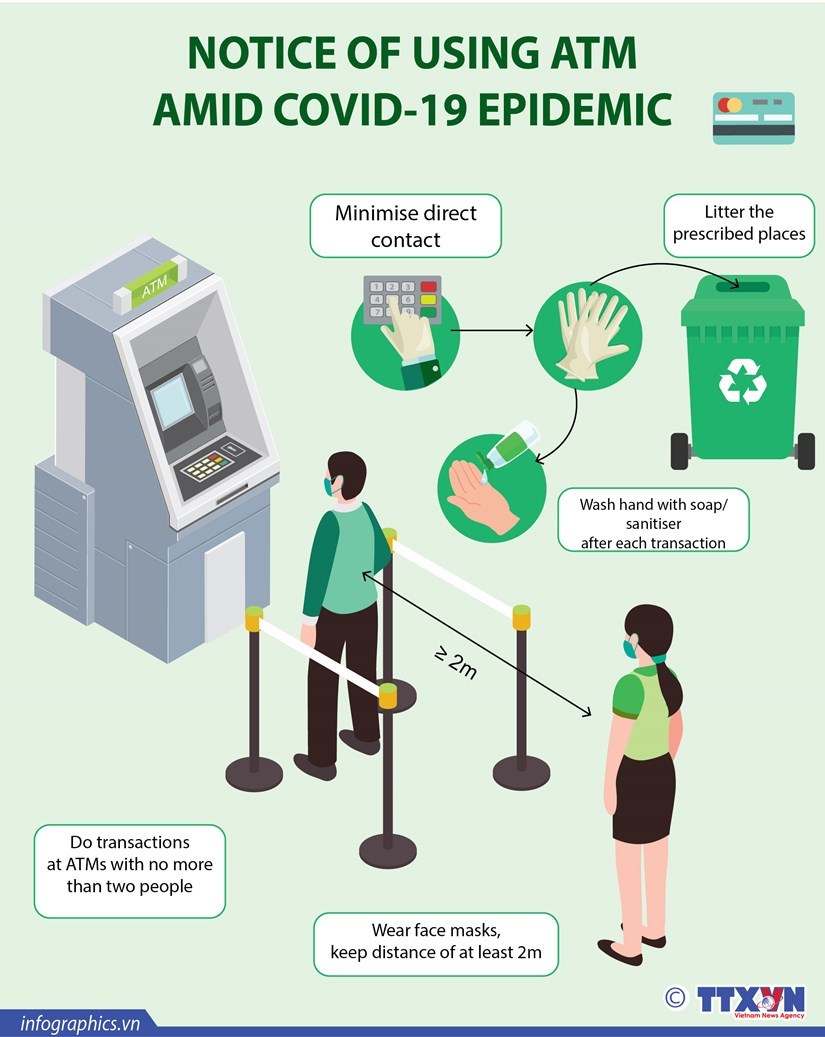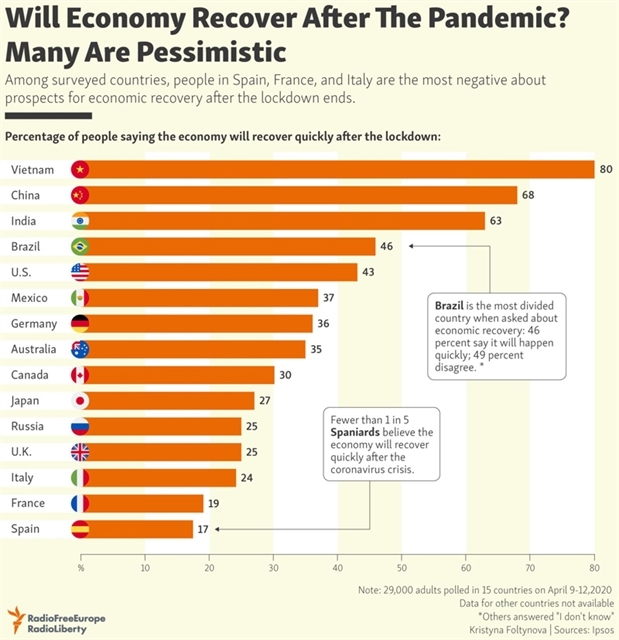 |
|
|
Eighty per cent of Vietnamese respondents in a survey by multinational market research firm IPSOS believed that the country’s economy could recover quickly after the disruptions caused by the COVID-19 pandemic.
This is the result of an IPSOS survey conducted on April 9 to 12 this year on the Global Advisor online platform among 28,000 adults aged between 16 and 74 in 15 countries.
These include Canada, the US, Australia, Brazil, China, France, Germany, Italy, India, Japan, Mexico, Russia, Spain, Việt Nam and the UK.
Three out of 15 countries polled by IPSOS believed in a quick recovery once the lockdown from the coronavirus pandemic is over.
They are Việt Nam, China (68 per cent) and India (63 per cent).
However, a majority of people in 10 of the 15 countries disagreed that the economy would recover quickly – suggesting a lasting impact.
People in Spain (76 per cent), France (72 per cent), Italy (68 per cent), the UK (67 per cent), Russia and Japan (64 per cent), and Canada (62 per cent) feel most strongly against a quick economic recovery.
At the same time, one of the countries most divided on this question is the world’s largest economy – the US with nearly half of those surveyed (49 per cent) disagreeing on a quick recovery, while 43 per cent thought it would happen.
One more patient with COVID-19 recovers, total hits 216
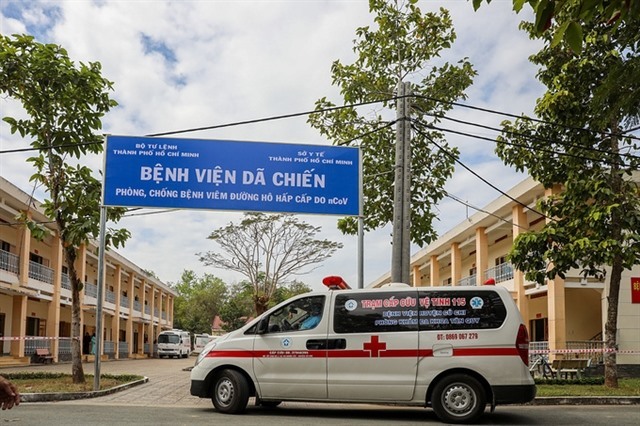 |
|
One more patient with COVID-19 has recovered and was discharged from the Củ Chi Field Hospital in HCM City on Tuesday.
|
A 20 year-old Vietnamese man is the country's latest COVID-19 patient to recover at the Củ Chi Field Hospital in HCM City on Tuesday, bringing the country’s total recoveries to 216.
Patient 248 returned home from the US on March 23 and then was admitted to the hospital on April 7. During treatment, he was tested three times and all tests came back negative for SARS-CoV-2 on April 13, 15 and 19. The patient currently has no fever, cough, or breathing difficulties and is in a stable condition.
The patient will continue to be isolated and monitored for the next 14 days, according to the Sub-Committee for Treatment of the National Steering Committee on COVID-19 Prevention and Control.
As of noon on Tuesday, the Ministry of Health reported no new cases of COVID-19 over the past five days in Việt Nam. The country’s confirmed number of COVID-19 patients still stands at 268, of which 81 per cent have recovered and no fatalities have been reported.
More than 2.4 million COVID-19 cases have been recorded globally in 212 countries and territories (including two cruise ships), and 165,739 deaths.
HCM City enters third stage of COVID-19 prevention as transmission risk still high
|
|
| As of April 20, HCM City has had 54 COVID-19 patients, including 49 who have recovered and have been discharged from hospitals. — Source https://ttbc-hcm.gov.vn/ |
HCM City will enter the third stage of COVID-19 prevention and control after the city ends social distancing on April 22, but the risk of transmission will remain high, according to the city's Centre for Disease Control and Prevention.
Transport will resume operation, so the risk of COVID-19 infection in the community will remain high.
The centre noted that many people infected with the coronavirus will not have any symptoms, and the transmission source may be unknown.
In addition, the city will see an increase in the number of dengue fever patients after the rainy season begins, which will impact personnel and others taking part in the prevention and control of COVID-19.
The centre said that early detection of new incidences of COVID-19, especially those who do not have any symptoms, will be a “survival problem” for the city.
To prevent community transmission, health officials will try to identify and isolate people who have had contact with infected people.
The city also plans to quarantine people entering Việt Nam from other countries.
The current stage is the “golden time” for the city to reinforce the system for prevention and control of COVID-19 and to prepare plans and methods to adapt to the pandemic, according to the centre.
Dr Nguyễn Trí Dũng, head of the centre, said the city was improving the capacity of the city’s rapid action force.
The city is testing passengers for COVID-19 at Tân Sơn Nhất International Airport, bus stations, and workers at residential apartment buildings and industrial parks, Dũng added.
On April 19, 1,195 passengers were tested at the airport. As many as 394 passengers were tested at the railway station.
As of April 18, 2,063 workers in districts 7, 12, and Thủ Đức had been tested, including 2,050 who tested negative for COVID-19.
The centre will continue working with agencies to evaluate risk levels of transmission and offer warnings and methods for prevention in areas with large numbers of people, such as factories, schools, and others.
The centre will also strengthen IT application in surveillance, management, tracking and quarantine of people who have close contact with COVID-19 patients.
Many people in the city have begun ignoring preventive measures and have become complacent because there have been no new COVID-19 incidences recorded over the last 10 days. The risk of transmission, however, will continue after social distancing regulations are removed.
The centre has urged people in the city to strictly comply with regulations and preventive measures such as washing hands regularly, wearing masks, keeping two metres apart and others.
The city has also instructed relevant agencies to establish a set of criteria to evaluate risks of transmission in each industry.
The city People’s Committee has approved the closure of schools until May 3.
As of April 20, the city has had 54 COVID-19 patients, including 49 who have recovered and have been discharged from hospitals.
On April 20, two more patients are expected to be discharged from hospitals.
Among the remaining three patients, one is using extracorporeal membrane oxygenation which adds oxygen to blood and pumps it through the body. The other two are in stable condition and are still being treated.
Front pledges transparent funding allocation in support of COVID-19 fight
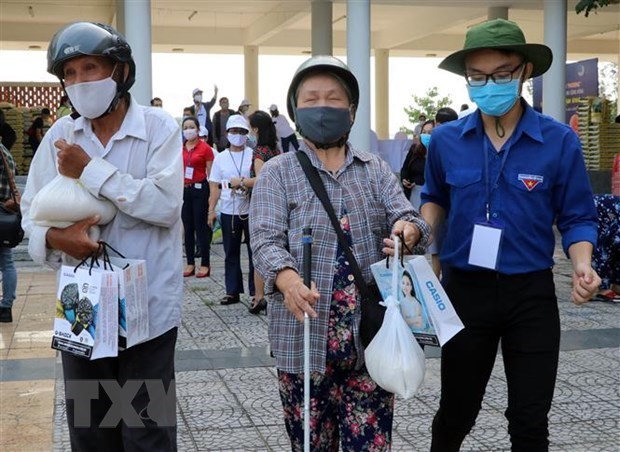 |
|
Providing rice for people with disabilities |
The Vietnam Fatherland Front (VFF) will remain open and transparent in allocating money and goods it has received to promptly support those on the front line of the COVID-19 pandemic.
The statement was made by President of the VFF Central Committee Tran Thanh Man at a ceremony in Hanoi on April 20 to receive 100 million VND (4,260 USD) from the Hanoi Open University and 162 million VND in cash and 308 million VND worth of goods from the Vietnam Small- and Medium-Sized Enterprises Association.
Man expressed his gratitude to the donors for working with the Party, State and Government to fight the disease.
On the same day, the VFF chapter in An Giang province and the province’s Central General Hospital received 500 SARS-CoV-2 test kits from the Vietnamese Young Entrepreneurs’ Association to serve the locality’s COVID-19 prevention and control efforts.
Head of the An Giang chapter of the Vietnamese Young Entrepreneurs’ Association Nguyen Thanh Viet said that responding to the VFF Central Committee’s appeal, the An Giang chapter had raised 100 million VND from its members to support the fight.
According to the An Giang VFF chapter, the province has so far received 13 billion VND from organisations, individuals, businesses and religious organisations in support of those affected by the pandemic, and drought and saline intrusion. In addition, 15 “rice ATMs” with about 60 tonnes of the grain have been installed in the locality to assist disadvantaged people.
Meanwhile, president of the VFF Quang Binh chapter Pham Thi Han said it has received and allocated money and goods totalling 13.3 billion VND to support people affected by the pandemic and health workers on the front line.
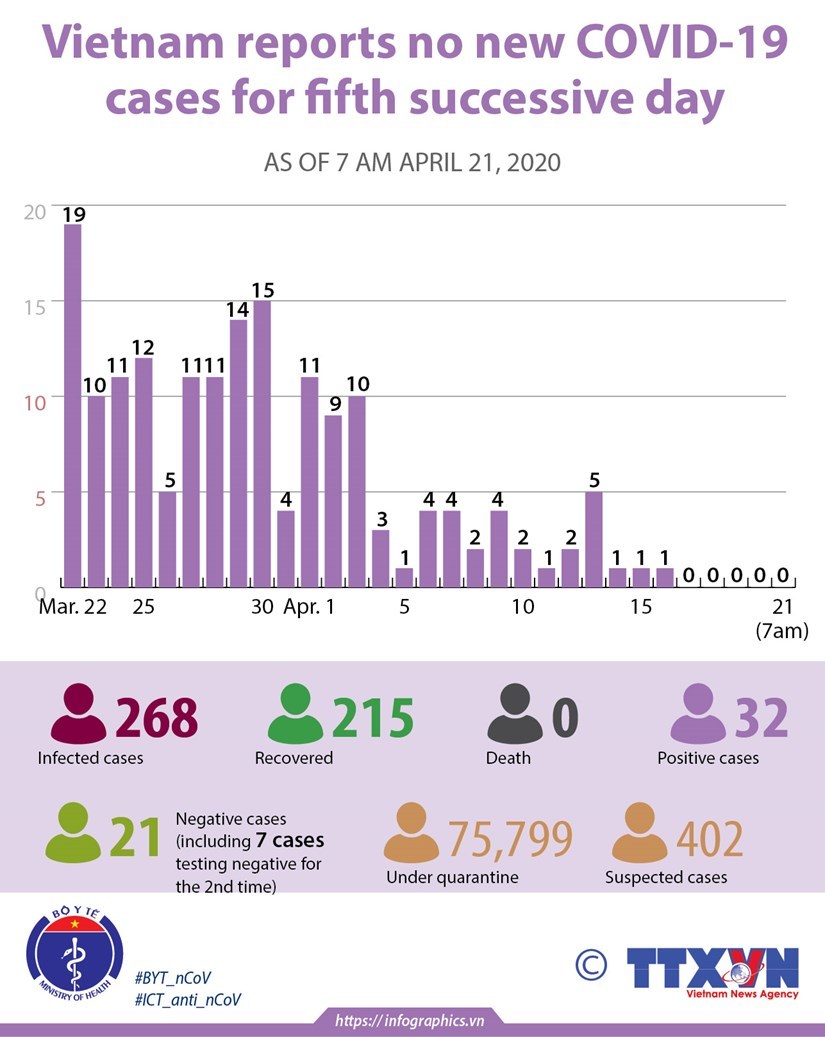 |
||
|
|
Medical supplies to northern Lao provinces
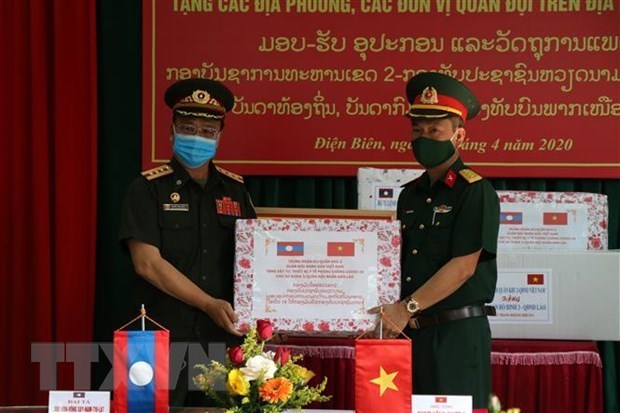 |
| Officer of the Military Region 2 High Command (R) presents medical supplies to representative of nothern Lao provinces |
Commander of the Military Region 2 High Command, Major General Pham Hong Chuong transferred medical supplies and equipment to representatives of northern Lao provinces on April 21 to support their fight against the COVID-19 pandemic.
This included 90,000 antibacterial face masks, 20 infrared thermometers to measure body temperature, and 3,000 disinfection gel tubes.
The command also presented a number of COVID-19 prevention and control documents translated into Lao to the localities.
Speaking at the handover ceremony at Dien Bien province’s Tay Trang International Border Gate, Chuong expressed his belief that with joint efforts by the two governments, peoples, armed forces and health sectors, the pandemic will be contained soon, thus helping stabilise locals’ lives and boost socio-economic development.
A representative of the northern Lao provinces thanked the command for its support, stressing that the medical supplies will be allocated to Lao localities and armed forces in the most suitable way to combat the COVID-19./.
Unilever distributes essential hygiene products to the frontlines
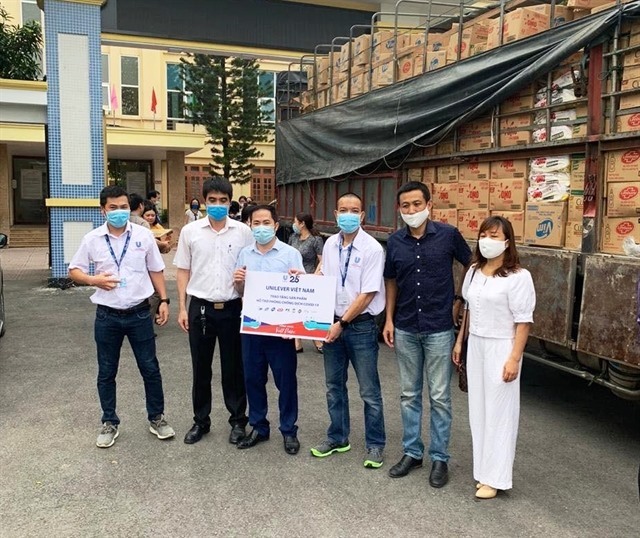 |
Unilever in collaboration with the Ministry of Health and through coordination with the Việt Nam Fatherland Front Central Committee, continues to provide its products to help frontline medical facilities in the fight against the COVID-19 pandemic.
The Unilever support package, worth VNĐ18 billion (US$770,000), includes more than 220 tonnes of essential hygiene products, which will be distributed to 105 medical facilities in 37 provinces and cities across the country. They are provincial health departments, frontline hospitals, concentrated isolation areas, field hospitals and COVID-19 patient isolation and treatment facilities.
On April 20, Unilever delivered support products to over 40 locations in Hà Nội, Bắc Giang, Bắc Ninh, Hà Nam, Cao Bằng, Quảng Ninh, Quảng Nam, Thừa Thiên Huế and Đà Nẵng City. The remaining localities will receive the support package in the next two days.
The support package is part of Unilever’s “Stay Strong Vietnam” programme, a wide-ranging set of measures to support the community and people in the fight against the COVID-19 virus.
As part of the programme, Unilever committed VNĐ50 billion (US$2.245 million) to partner with the Ministry of Health and the Ministry of Education and Training to implement initiatives that will protect people through hand-washing and surface-cleaning product donations and hygiene habit education programmes.
Unilever is also working with the health ministry to widen the community’s awareness about hand-washing and surface-cleaning habits and COVID-19 prevention information, to strengthen Vietnamese hygiene practices and help fight this and other diseases.
“Unilever understands that maintaining personal hygiene and living environments is a vital condition for preventing the spread of COVID-19. Therefore, we launched the "Stay strong Việt Nam" programme in cooperation with the Ministry of Health, through the Vietnam Fatherland Front coordination, to bring essential hygiene products to support the patient, quarantined people, front-line doctors and nurses, their families and the community to protect their health, stay strong to win the battle against the Covid-19 pandemic," said Lê Thị Hồng Nhi, Senior Manager of Sustainable Development & External Communications, Unilever Vietnam. VNS
Cambodia works to ensure food supply amid pandemic
The Cambodian government on April 21 urged domestic instant noodle producers to increase daily output to nearly 700,000 boxes, aiming to maintain a stable supply and price of the product in the market amid the COVID-19 pandemic.
The move follows Prime Minister Hun Sen's order on April 5 for noodle producers and bottled drinking water companies to boost production during the outbreak.
The government said Cambodia currently has three instant noodle factories with an output of about 670,000 boxes per day. These factories have been required to set up a stockpile of about 150,000 boxes of noodles.
Previously, on April 16, Cambodian Minister of Agriculture, Forestry and Fisheries Srey Vuthy said the government has encouraged local importers to buy pork products for stockpiling with the volume of 130 tonnes per day in the next three months as part of effort to ensure adequate supply of food and foodstuff to people during the COVID-19 outbreak.
Annually, Cambodia consumes about 290,000 tonnes of meat, including 82,000 tonnes of beef, 153,000 tonnes of pork, 54,000 tonnes of poultry and 165 tonnes of other meats. The Southeast Asian nation can produce 239,000 tonnes of meat, meeting 82 percent of domestic demand./.
Hanoi and HCM City propose to ease social distancing
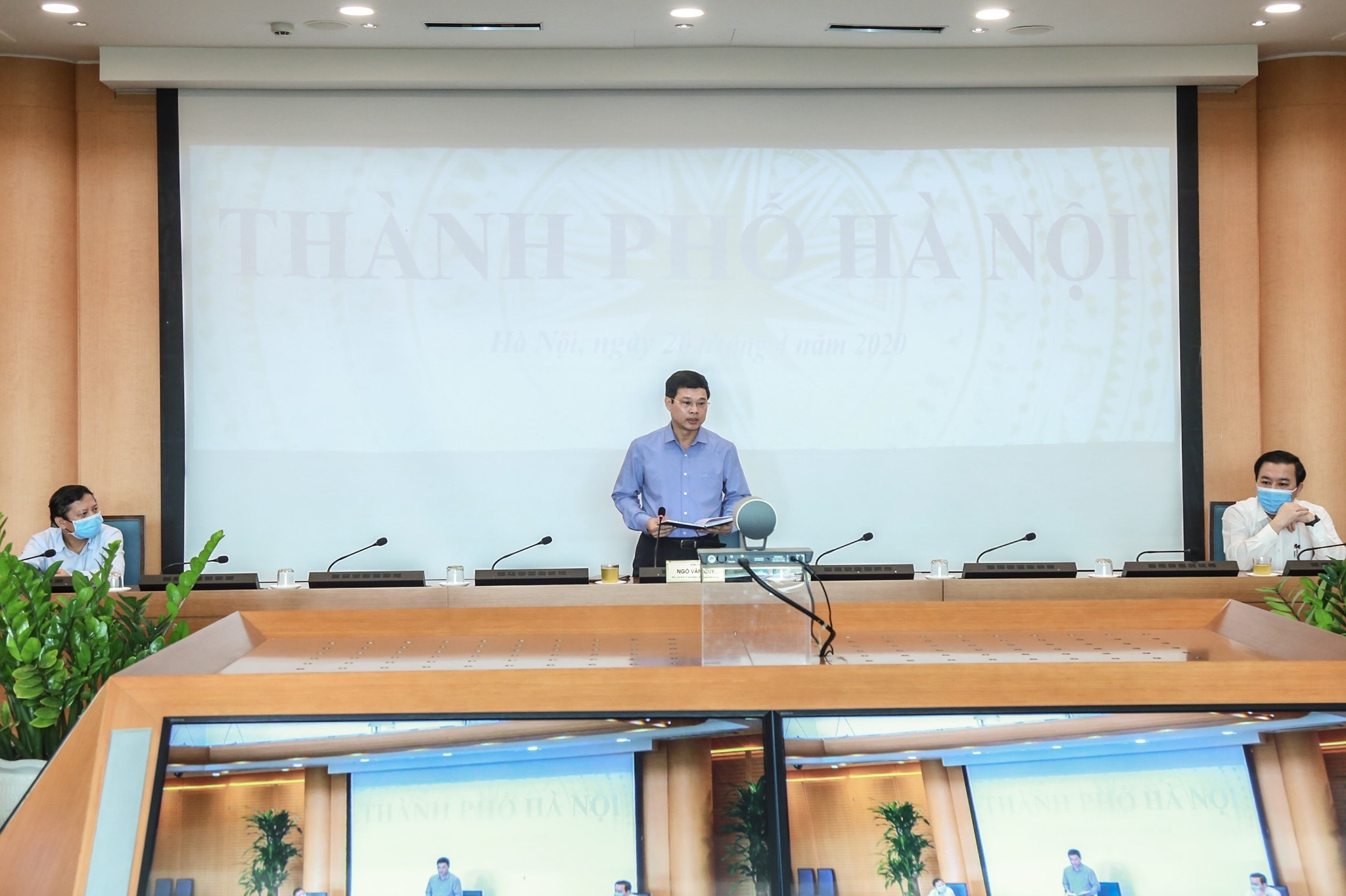 |
|
Vice-Chairman of Hanoi People's Committee Ngo Van Quy
|
Vietnam’s largest cities Hanoi and HCM City have proposed to ease social distancing regulations after April 22.
The proposal was made during the meeting led by Prime Minister Nguyen Xuan Phuc about Covid-19 prevention and control.
Vice-Chairman of Hanoi People's Committee Ngo Van Quy reported that they were continuing to monitor the situation at Ha Loi Village. 12,673 people have been tested and five positive cases have been confirmed last week. 12,668 people were tested negative. There are 734 people who had made close contact with the patient and 727 have been quarantined while seven people were tested positive.
1,793 people involved in the outbreak at Me Linh Flower Market have tested negative.
Regarding the outbreak at Dong Cuu Village, Thuong Tin District, 1,196 people tested negative and 50 people that have close contact with the patient also tested negative. In the past two days, Hanoi has tested 1,064 traders at five major markets and the tests came back negative.
Quy said the situation in Hanoi had improved and community spreading has slowed down. Quy proposed to ease social distancing in the capital after April 22 if no new cases are reported. Quy also asked the Ministry of Health and related agencies to quickly issue guidance and preventive measures at offices, factories and construction sites in order to let people resume businesses.
Chairman of HCM City People's Committee Nguyen Thanh Phong agreed and had the same proposal to resume businesses depending on the situation. The proposal also gained support from other ministries.
Covid-19-hit Vietnamese people in Indonesia to be repatriated
Vietnamese people who have been affected by the on-going Covid-19 pandemic in Indonesia will be brought home to ensure safety.According to the Vietnamese Embassy in Indonesia, the pandemic in the country remains very complicated; so the embassy has been working with Vietnamese concerned agencies to get some priortised groups home.
The list includes children, students under 18 years old, students whose dormitory has been closed, people aged over 60, people who are taking treatment in Indonesia and those whose visa has expired.
The embassy is the only agency to receive people’s registrations.
Prime Minister Nguyen Xuan Phuc has instructed Vietnamese representative agencies to propose measures to help Vietnamese nationals abroad return home if they wish. This included prioritising people aged below 18, the elderly and those with health problems.
On April 15, national flag carrier Vietnam Airlines transported 93 Vietnamese from the UK home. Three days later, the carrier brought another 52 Vietnamese from Italy back to the country.
The Vietnamese Embassy in the US reported that around 1,000 Vietnamese people in the US wanted to return to Vietnam.
HCM City businesses take safety measures to protect workers from coronavirus
 |
|
Workers at Pouyuen Việt Nam Company in HCM City have their temperatures checked at the factory gate. |
Government agencies and businesses in HCM City are taking proactive measures to protect employees and prevent the spread of COVID-19.
The city has 415,000 companies which employ 3.2 million people.
Nearly 6,300 have carried out assessments of COVID-19 infection risks based on a set of indicators issued by the city’s Steering Committee for COVID-19 Disease Prevention and Control, according to the Department of Health.
More than 3,700 rated their infection risk at a very low level, 2,483 at a low level, 77 at a moderate level, and only five at a high level.
The steering committee in co-ordination with district-level medical centres carried out onsite inspections at 1,687 businesses and factories with less than 3,000 workers.
It found 45 per cent had a very low level of infection risk, 53 per cent had a low level and the remaining 2 per cent had a moderate level, according to the Department of Health.
It also inspected 22 businesses with more than 3,000 workers. One, Pouyuen Vietnam, had very high level of infection risk and was ordered to close its factory on April 14 and 15.
It was allowed to reopen after it introduced safety measures to protect its workers. It arranged for 30 per cent of the workers to take leave to prevent crowding and enable distancing between workers.
Huỳnh Ngọc Thành, deputy director of the city Centre for Disease Control and Prevention, said businesses rated as facing a high level of infection risk were ordered to install safety measures to protect workers if they wanted to remain open.
The HCM City Export Processing Zone and Industrial Park Authority (HEPZA) instructed businesses in industrial parks and export processing zones to strictly comply with regulations and advisories on COVID-19.
More than 1,000 businesses employing 274,600 workers operate in the city’s 17 industrial parks and export processing zones.
Nguyễn Thị Hồng Liên, head of HEPZA’s labour management office, said it ordered businesses to adopt safety measures based on advisories from the Steering Committee for COVID-19 Disease Prevention and Control.
Many businesses such as Samsung, Unilever, Longrich, and Hansea have rescheduled shifts and meal timing to prevent overcrowding and set up safety screens at dining tables to enforce social distancing guidelines, she said.
Vietnam reports no new COVID-19 cases for fifth successive day
|
|
|
Residents in Hanoi get COVID-19 testing. |
Vietnam reported no new COVID-19 cases on April 21 morning, making it five days in succession without any new patients, according to the National Steering Committee for COVID-19 Prevention and Control.
The total number of COVID-19 cases in the country stays still at 268, with 160 coming from overseas and 108 infected among the community. Twelve of them made full recovery on April 20.
Currently, only 53 patients are being quarantined and treated at nine health centres. Among them, 14 have tested negative for the novel coronavirus once and seven negative twice.
A total of 75,799 people are being quarantined or under health monitoring, of whom 268 stay in hospitals, 15,368 in other facilities and 60,163 at home.
Medical experts said it is necessary to keep a close watch on recent clusters such as Ha Loi village in Me Linh district, Hanoi, and continue with contact tracing.
Medical agencies, local authorities and residents should maintain preventive measures and remain vigilant as new outbreaks can happen anytime.
Ninh Binh supports stranded foreign tourists
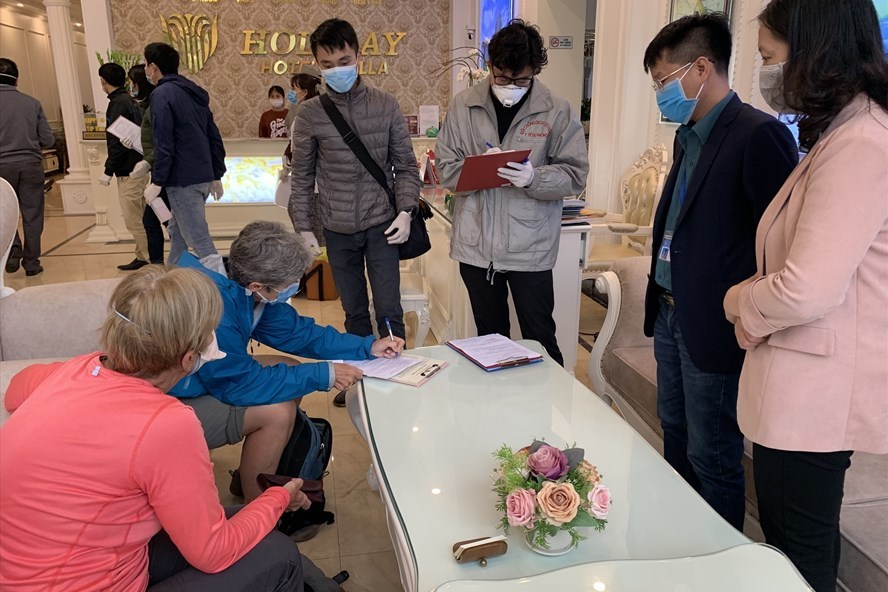 |
|
Foreign tourists in a hotel in Ninh Binh
|
The northern province of Ninh Binh has actively assisted foreign tourists who have remained stranded in the locality due to Covid-19.According to Nguyen Khac Khoan, a representative from Ninh Binh’s Department of Tourism, at present, 76 tourists from 31 countries and territories are staying in 28 local accommodation. Most of them came to Vietnam before the Covid-19 outbreak. They are facing difficulties to return home due to the pandemic and many have had their visas expire
Since March 13, Ninh Binh has closed all of the local tourist sites.
Under provincial authorities’ instruction, tourists are requested to strictly conform to the Vietnamese government’s social distancing measures. They also have frequent medical checks.
The province’s accommodation facilities have slashed room rates and other service fees for travellers. If tourists want to buy necessities, hotel and guesthouse receptionists will help them.
Ninh Binh authorities have contacted foreign embassies in Vietnam to help tourists with visa problems.
Vietnam can conduct 13,000 COVID-19 tests a day: National Committee
|
|
| HCM City's Centre for Disease Control (CDC) takes a throat swab sample from a worker. |
Việt Nam has "basically" met the demand for confirmatory testing for COVID-19, the National Steering Committee for COVID-19 Prevention and Control said on Monday.
Across the country, 111 laboratories are now capable of diagnosing the novel coronavirus by using real-time RT-PCR technology.
Among them, 39 have been given the go-ahead to conduct confirmation tests, including 22 central-level healthcare establishments and hospitals, 14 centres for disease control (CDCs), and three other units outside the health sector. Their maximum capacity is 13,000 samples per day.
The committee said the World Health Organisation (WHO) has provided Việt Nam with about 10,000 test kits, and is considering the provision of 40,000 real-time RT-PCR kits made in Germany. Meanwhile, domestic firm Việt Á has distributed more than 70,000 test kits to labs.
The Ministry of Health has also allocated 40 rapid testing machines and over 30,000 accompanying kits, along with 140,000 biological products produced by Việt Á for real-time RT-PCR tests.
The facilities have also proactively sought supplies from other domestic and foreign sources.
Việt Nam had not recorded any new COVID-19 cases on the morning of April 20, keeping the total number at 268. This marked the fourth straight day with no new infections confirmed in the country. Among the patients, 207 have recovered.
Seven more patients with COVID-19 recover in Ninh Bình Province, total at 214
Seven more patients with COVID-19 recovered and were discharged from the Ninh Bình Provincial General Hospital on Monday afternoon.
The new recovered cases have brought the number of patients being given the all-clear on Monday to 12 and the country’s total recovered patients to 214, making up nearly 80 per cent of COVID-19 confirmed cases in Việt Nam.
They are all Vietnamese nationals, specifically as follows:
Patient 164, male, 23, was admitted to the hospital on March 26. During treatment, he had four tests and all tests were negative for SARS-CoV-2 on April 9, 11, 13 and 19.
Patient 165, male, 58, was admitted to the hospital on March 26. The patient also has had four tests with negative results for SARS-CoV-2 on April 9, 11, 13 and 19.
Patient 180, female, 27, was admitted to the hospital on March 26. All of the patient’s tests were negative for SARS-CoV-2 from April 13 to 19.
Patient 181, male, 33, was admitted to the hospital on March 26. During treatment, he was tested four times and all tests were negative for SARS-CoV-2 on April 9, 11, 13 and 19.
Patient 182, female, 19, was admitted to the hospital on March 26. All tests were negative for SARS-CoV-2 from April 9 to 17.
Patient 230, female, 28, was admitted to the hospital on April 3. All of the patient’s test results were negative for SARS-CoV-2 from April 9 to17.
Patient 240, female, 29, was admitted to the hospital on April 1. She had four tests and all tests came back negative for SARS-CoV-2 on April 11, 13, 15 and 17. At present, the patient has no fever, no cough, no breathing difficulties and is in a stable condition.
All of the seven patients will continue to be isolated and monitored for the next 14 days, according to the Sub-Committee for Treatment - National Steering Committee on COVID-19 Prevention and Control.
As of Monday evening, Việt Nam reported no new COVID-19 cases over the past four and a half days. The country’s total COVID-19 patients still stands at 268 and no fatalities have been reported.
Steering Committee: Social distancing measures prove effective
 |
|
Meeting of National Steering Committee for COVID-19 Prevention and Control |
Social distancing measures have proven effective in Vietnam’s fight against the COVID-19 pandemic, with only eight new cases reported in the week of April 13-19, the National Steering Committee for COVID-19 Prevention and Control announced on April 20.
Vietnam is controlling the disease well, the committee said, with no new cases recorded from April 17 to 19.
The latent risk of infection remains, however, and health offices, local authorities, and people must continue to implement preventive measures.
Any loosening of social distancing measures should be carried out gradually and in accordance with the local situation, while socio-economic development goals are to also be soundly implemented, the Steering Committee emphasised.
Regarding the 188th patient, who tested positive after being discharged from hospital, Deputy Minister of Health Nguyen Truong Son said she had tested negative twice and was quarantined at her home in Hanoi’s Thuong Tin district. She exhibited a cough and shortness of breath on April 17 and tested positive for the virus. She was hospitalised at the National Hospital for Tropical Diseases a day later. On the morning of April 19, the result of her test using the Real-time PRC method was negative. Her sample will be tested one more time on April 20, Son added.
He also said that the ministry has set up two inspection teams to supervise all of its hospitals. Health clinics, meanwhile, have set up separate areas to cater to patients and all health workers have been equipped with protective gear.
The Steering Committee had directed the ministry to continue monitoring regulations relating to the reception of people at health clinics.
Local authorities have been requested to issue supplementary regulations based on the guidance from the health sector, with the Chair of provincial people’s committees to be responsible for infections at health clinics.
The Steering Committee also asked the Ministry of Industry and Trade to prepare more thorough instructions for business operations.
Discussing safe travel, Deputy Minister of Transport Le Anh Tuan said the ministry will review existing guidance on ensuring safety on flights and in inter-provincial buses and taxis, and will update preventive measures in accordance with instructions from the health sector.
Meanwhile, Deputy Minister of Culture, Sports and Tourism Trinh Thi Thuy said the ministry will share updated preventive measures with tour guides, travel agents, hotels, and tourism service providers.
Steering Committee members have suggested stepping up the application of information technology in monitoring compliance with COVID-19 prevention and control regulations.
It has asked ministries, sectors, and localities to remain vigilant and tackle the virus so that production and business may develop once again.
“Rice ATMs” supporting people nationwide during pandemic
 |
| A woman receives rice from a dispenser in Ben Tre province |
“Rice ATMs” have played an indispensable role in helping disadvantaged people nationwide navigating the hardships caused by the COVID-19 pandemic.
Two new rice dispensers, colloquially known as “Rice ATMs”, were installed in Cam Le district in the central city of Da Nang on April 20 and provide local people with three tonnes of free rice each day.
It is part of a programme to support the poor and disadvantaged affected by the pandemic and is projected to run for two months, depending on demand.
Vice Chairman of the Da Nang Young Entrepreneurs Association Nguyen Hong Cuong, head of the programme organizing board, said additional dispensers will be set up in the next few days for people in Son Tra and Hai Chau districts.
The programme to date has received 135 tonnes of rice, four dispensers, 150 million VND (6,420 USD), and more than 15,000 face masks and other supplies from donors, he added.
The dispensers distribute bags of rice to local people, many of whom are street vendors or earn a living from cash jobs like housekeeping or selling lottery tickets.
Those waiting in line are required to stand two meters apart and must use hand sanitizer before receiving their portions.
One bag of rice is sufficient for most families for one day.
On the same day, the first “Rice ATM” was installed in Rach Gia city in the Mekong Delta province of Kien Giang.
In nearby Ben Tre province, two dispensers were recently installed and opened by the local chapter of the Vietnam Fatherland Front together with local businesses and individuals. Some 55 tonnes of rice along with 10,000 eggs were donated on the first day.
Ben Tre was the first Mekong Delta locality to have a “Rice ATM”, supported by the dispenser’s inventor Hoang Tuan Anh. He also provided 25 tonnes of rice to the province, which has also been affected by saline intrusion.
The dispensers will operate beyond the ongoing pandemic, until the end of the year or even longer, in a bid to support the poor in the province.
About 40,000 poor and near-poor households and policy beneficiaries in Ben Tre have been affected by COVID-19, while tens of thousands of hectares of crops have been damaged by saline intrusion which isn’t forecast to end until mid-May.
HCM City focusing on ensuring safe workplaces amid COVID-19 outbreak
HCM City is making extra efforts to ensure safe production amid the COVID-19 outbreak, as Vietnam’s largest economic hub is now home to 415,000 businesses with 3.2 million workers.
The city’s Steering Committee on COVID-19 Prevention and Control has used a set of indicators to measure the risk of infection and classify enterprises permitted to continue operations.
The city has set up inspection teams to monitor the application of such indicators at local enterprises as well as Prime Minister Nguyen Xuan Phuc’s Directive No. 16 on social distancing measures.
Its Centre for Disease Control has guided businesses on how to carry out measures to minimise the risk of infections and recommended they request employees keep a certain distance from each other and wear face masks while at work.
When inspecting businesses at the Tan Thuan Export Processing Zone recently, Chairman of the HCM City People’s Committee Nguyen Thanh Phong asked that close contact be minimised in crowded areas.
He urged businesses to sign commitments to following COVID-19 prevention and control regulations and stepping up the application of IT in prevention efforts.
According to the city’s Management Board of Export Processing and Industrial Zones, it currently has 17 such zones with about 1,100 enterprises and nearly 280,000 workers. Most companies have arranged staggered shifts to ensure social distancing.
Secretary of the HCM City Party Committee Nguyen Thien Nhan recently asked businesses to strictly follow social distancing measures as regulated in Directive No. 16. “The State does not prevent enterprises from manufacturing, but economic development must meet certain requirements and not pose risks to people’s safety,” he emphasised. “Only when enterprises meet all the criteria on disease prevention will they be permitted to operate.”
According to the city’s Department of Labor, War Invalids, and Social Affairs, 75 percent of the businesses have cut their production since the lunar new year (Tet) holiday in late January, with 600,000 people losing their jobs./
Singapore posts highest COVID-19 infections in Southeast Asia
 |
|
|
Singapore tops Southeast Asia in terms of COVID-19 infections, with a record 1,426 cases announced on April 20 raising its total to 8,014.
It surpassed Indonesia and Malaysia on April 19 in terms of infections. The majority are foreign workers living in dormitories, with concerns held about infections spreading in the community, especially from asymptomatic patients.
It is forecast that its total could reach 20,000 later this month.
From April 20, 180,000 construction workers, primarily living in dormitories, will be put under quarantine until May 4.
Singapore handed over free face masks to about 400,000 immigrant workers and 250,000 housekeepers on April 20. Each foreign worker will receive two reusable cloth masks and one medical mask, funded by philanthropists under the “MaskForce” initiative.
Singapore will continue social distancing measures and enhance inspections and punishment to mitigate any spread of infections in the community.
Foreign media praise Vietnam's response to COVID-19 pandemic
Thanks to its prompt and drastic responses, Vietnam has stood firm in the face of the COVID-19 pandemic, foreign media have said.
According to the National Public Radio (NPR) of the US, the foundation of Vietnam's success in the work is the early implementation of a drastic policy by the government on social distancing, as well as the country’s experience against previous epidemics.
It said that with experience gained from dealing with the 2003 SARS and 2009 H1N1, the Vietnamese government started organising its response in January - right after reports began from China's Wuhan, where the virus is believed to have originated.
The country quickly came up with a variety of tactics, including widespread quarantining and aggressive contact tracing, it noted.
Meanwhile, The Strategist of the US said Vietnam has reported no deaths from COVID-19 in recent days and just 268 confirmed cases.
This is a result of careful and extensive monitoring of public travel and regular temperature checking at airports, border gates and public places, as well as well managing centralised quarantine areas, it said.
According to the newspaper, Vietnam has shown itself as one of “leaders" in inventing and exporting fast virus test kits with affordable prices.
It emphasised that Vietnam's key strategy is responding quickly to reduce infection and the burden on medical staff.
International media also spotlighted Vietnam’s willingness to share practical experience and its support for other countries in the fight against the disease.
According to Nikkei Asian Review, that Vietnam's measures against COVID-19 is for the benefit of the whole community.
After all these hard challenges, Vietnam's voice will be very weighty and convincing, not only on the regional forum but also in the international arena, it said.
Bloomberg has reported that Vietnam donated 250,000 medial face masks to the US, handed over made-in-Vietnam face masks and medical equipment worth 100,000 USD to Japan, and a great number of medical supplies to its neighbours Cambodia and Laos, and European countries.
Meanwhile, Rossiyskaya Gazeta of Russia also reported on Vietnam’s donation of 200,000 domestically-produced face masks to Russia to help the country in the fight against COVID-19.
Japanese ventilators handed over to help fight COVID-19
 |
|
At the handing-over ceremony |
Vietnamese Ambassador to Japan Vu Hong Nam took receipt of two Eliciae MV20 ventilators manufactured by Japan’s Metran Co., Ltd at a ceremony in Tokyo on April 20.
They are part of a batch of the 2,000 ordered by the Van Thinh Phat Group and the Van Lang University as donations to the Vietnamese Government in the fight against COVID-19.
In his address at the handover ceremony, Ambassador Nam thanked the two donors for their support and Metran’s efforts and dedication in researching and manufacturing the machines.
The Eliciae MV20 ventilators use the most advanced technology in the industry, are easy to use and environmentally-friendly, and meet the examination and treatment needs of hospitals not only in big cities but also in remote areas.
Apart from funding the purchase of the 2,000 ventilators, the Van Thinh Phat Group and the Van Lang University have also provided financial assistance for the effective maintenance of the machines and the training of Vietnamese doctors in their use.
Ambassador Nam, on behalf of the two donors, also presented 200,000 USD to the Vietnamese Association in Japan to help the community overcome difficulties caused by the pandemic.
Vietnamese in Australia helping one another during COVID-19
 |
| Diem Kieu distributes rice, egg and instant noodleto help Vietnamese Australians in need during Covid-19 |
Vietnamese communities around Australia have helped their compatriots during the COVID-19 pandemic in a spirit of “the haves helping the have-nots”.
Businessman Diem Kieu Fuggersberger and his partners at Berger Ingredients and Coco & Lucas’ Kitchen in Sydney have distributed five tonnes of rice, 1,550 eggs, and 2,000 packets of instant noodles to over 300 Vietnamese Australians.
Likewise, the Facebook page Vietnamese Students in Melbourne (VMS) raised nearly 10,000 AUD (6,000 USD) to help Vietnamese people in need in the city. The campaign is being run by Facebook administrator Nguyen Duc Quyet and other group members who bought meat for those registered in the “Rice with Meat” programme. Each beneficiary will have 3 kg of meat delivered to their door.
Meanwhile, the group “Vietnamese Mummy in Aus” has mobilised nearly 25,000 AUD as well as food and other supplies to help Vietnamese people in Australia grappling with the pandemic.
The campaign, launched on March 26, has helped nearly 300 people in need in Victoria, New South Wales, Queensland, and South Australia.
The group is one of the biggest social media-based campaigns in Australia, with nearly 13,000 members.
In the five years since its debut, it has provided support to disadvantaged people in Australia, particularly abused women.
Australia is home to over 250,000 Vietnamese people.
Vietnam, Cuba closely cooperating against COVID-19
 |
| Minister of Construction Pham Hong Ha (R) presents the token of the relief package to Cuban Anbassador to Vietnam Lianys Torres Rivera |
The Parties, States and armies of Vietnam and Cuba have been closely cooperating and supporting each other in effectively containing the spread of the COVID-19 pandemic amid its complicated developments and severe impact on all aspects of society.
On March 27, the Vietnamese Ministry of Defense’s leaders met the Cuban Ambassador and Military Attaché to Vietnam to suggest defense cooperation between the two sides in combating the disease, and in researching and producing quick test kits, vaccines and anti-viral drugs.
On March 31, Vietnamese Minister of Defense General Ngo Xuan Lich and Deputy Minister Nguyen Chi Vinh sent their letters to the Minister of Cuban Revolutionary Armed Forces and the Chief of the General Staff of the Cuban Revolutionary Armed Forces, respectively, to officially propose the above cooperation contents.
On April 1, Cuban Ambassador to Vietnam Lianys Torres Rivera announced that the Cuban Party, State and Army agreed with all the suggestions by Vietnam.
Accordingly, Cuba is ready to send medical experts to share its experience in COVID-19 treatment, provide Vietnam with medicines to treat COVID-19 patients in Vietnam, and work together to research and produce medicines, vaccines and fast test kits.
On April 2 and April 7, the two sides successfully organised online conferences with the participation of their experts who have rich experience in joining international assistance in global pandemics.
Participants discussed measures to prevent and control the pandemic, while sharing experiences on coordination among relevant ministries, sectors and agencies in the work.
They also touched upon ability to support each other in pharmaceuticals, medical equipment, and cooperation in research and production of vaccines, as well as other fields in the future.
The third conference of this kind is scheduled to take place in late April.
Regarding the sending of Cuban medicines and experts to Vietnam, as well as the providing the Cuban side with medical supplies that it needs, the two sides agreed to implement immediately after commercial flights to the two countries resume operation.
The recent cooperation between the two sides in preventing COVID-19 is vivid evidence to the long-lasting friendship and solidarity of the two nations.
The prompt support for Vietnam in the endeavour and the taking this as one of Cuba's top priorities have shown the Cuban side’s special sentiment to and political trust in Vietnam.
Petrolimex arms leading hospital to fight COVID-19
 |
|
At the hand-over ceremony (Photo: petrolimex.com.vn)
|
The Vietnam National Petroleum Group (Petrolimex) on April 20 presented medical equipment to Hanoi-based Bach Mai Hospital to help the national-level facility fight the raging COVID-19 pandemic.
With the equipment, worth 2.47 billion VND (105,400 USD), Petrolimex contributed over 14.1 billion VND so far to the combat.
Petrolimex Deputy Director General Nguyen Thanh Son said at the hand-over ceremony that the group has committed to presenting 3 billion VND worth of medical supplies to some hospitals in Hanoi to serve the fight.
Notably, Petrolimex staff members have donated one day’s salary worth a total of over 8.3 billion VND to COVID-19 prevention and control funds set up by local Fatherland Front Committees.
Thailand’s plan to lift some restrictions in free-virus areas considered
The Public Health Ministry of Thailand has proposed five requirements for an exit strategy from the Covid-19 lockdown, starting with 32 provinces.
At a joint meeting between ministry officials and deans of faculties of medicine on how to ease the lockdown, all agreed some measures have to be relaxed although a return to pre-crisis normality is out of the question, the Bangkok Post cited Kamnuan Ungchusak, an adviser to the Disease Control Department and to the public health minister on the Covid-19 situation, as saying.
The meeting came up with five pre-requisites for the exit strategy. They will be proposed to the Centre for Covid-19 Situation Administration for approval.
First, the screening of inbound visitors must remain stringent and facilities for 14-day state quarantine must be ready at all times. Each province must have a laboratory for tests and a system to look for infections among at-risk groups, highly populated communities, labourers and risk areas.
Second, all Thais must agree to observe good hygiene practices such as wearing masks when going to public places, observing social distancing and refraining from assembling. They must also come to terms with the fact that they can no longer lead a normal life after Covid-19.
Third, the private sector, led by the Thai Chamber of Commerce, Board of Trade of Thailand and Federation of Thai Industries, must consider categorising the types of businesses to be reopened based on their risks (high, medium and low) and rethink processes to minimise the risks.
Such changes must be based on four criteria. According to Kamnuan, the private sector must set an appropriate ratio between the number of customers and a service area unit. Activities must not involve shouting or a lot of verbal exchange. The places of business must be airy and well ventilated. Distancing within a service area must also be defined.
Fifth, the country must have in place a realtime monitoring system for infections at the national, provincial and district levels so people know the situation in each area.
Kamnuan said he believes that the country will move forward. However, not all 77 provinces will go ahead at the same pace. They will be allowed to reopen based on risks and by area.
Thailand reported 27 new cases of COVID-19 on April 20, lifting the country’s total to 2,792 cases. No new deaths were reported for the third consecutive day, according to the country’s centre for COVID-19 situation administration.
Indonesia extends work-from-home time as COVID-19 lingers on
 |
Indonesian Minister of Administrative and Bureaucratic Reform Tjahjo Kumo on April 20 said his Government has decided to extend the time of work-from-home for civil servants until May 13 to contain the spread of the COVID-19 pandemic.
According to Tjahjo, this decision may be further extended if necessary.
The Indonesian Ministry of Health said on the same day that the country recorded 185 new cases of COVID-19, bringing its total to 6,760.
Meanwhile, the Ministry of Foreign Affairs of Indonesia announced that there were 473 Indonesian citizens abroad infected with the disease, including 19 deaths.
In Cambodia, Health Minister Mam Bun Heng said over 10,000 textile workers from localities nationwide who returned to Phnom Penh after the New Year festival Chol Chhnam Thmay will be put into mandatory quarantine for 14 days.
He said by April 20, his country had not recorded any new COVID-19 cases for seven consecutive days.
Meanwhile, Malaysia confirmed 36 more cases of COVID-19 on the same day, increasing the total in the country to 5,425, including 89 deaths.
Vietnamese giant HAGL helps Laos buy medical supplies against COVID-19
 |
| At the handover ceremony |
The Hoang Anh Gia Lai (HAGL) Group donated 100,000 USD to the Lao Government on April 20 to help the country purchase medical supplies for its fight against COVID-19.
Speaking at the handover ceremony, Chief Representative of HAGL Che Quang Long said that since its first foray into Laos in 2007, the group has always received support from the Lao Government.
Given the pandemic is affecting all aspects of society in Vietnam’s neighbour, HAGL hopes to take on some responsibility in supporting the country to contain the outbreak.
The medical supplies to be purchased include 3,000 pieces of preventive gear, 205,000 face masks, 5,000 bottles of antiseptic solution, and 50,000 pairs of medical gloves.
Lao Deputy Prime Minister Somdy Duangdy expressed his gratitude towards HAGL for its help and pledged to effectively use the supplies purchased.
The Lao government is currently considering measures to create the conditions necessary for a number of economic sectors to resume activities while still strictly abiding by outbreak prevention measures, he said.
Vietnamese expats and enterprises in Laos have provided financial support, medical supplies, and technological solutions worth a total of over 500,000 USD to Laos since the beginning of the outbreak earlier this year.

